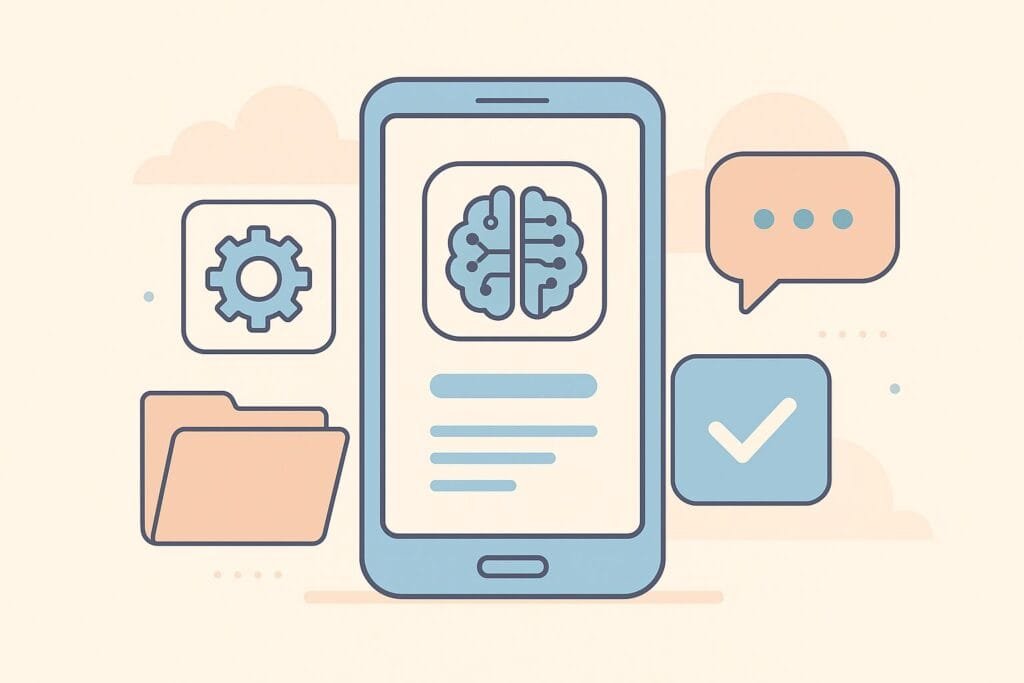Artificial Intelligence (AI) is transforming the way we interact with technology. From personal assistants like Siri and Google Assistant to advanced healthcare solutions and e-commerce personalization, AI-powered apps are becoming an essential part of our digital lives. But what exactly is an AI-powered app, and how does it work behind the scenes? Let’s explore the fundamentals, examples, benefits, and challenges of AI-driven applications.

Understanding AI-Powered Apps
An AI-powered app is a software application that integrates artificial intelligence technologies such as machine learning, natural language processing, and predictive analytics. Unlike traditional apps that only follow pre-defined instructions, AI apps can learn from data, improve over time, and provide personalized user experiences.
For example, when you use a music app that recommends songs based on your listening history, the app is using AI algorithms to analyze patterns and predict what you might enjoy next.
How Do AI-Powered Apps Work?
AI apps work by collecting data, analyzing it, and generating insights or predictions that guide the app’s behavior. The process typically involves several stages:
- Data Collection: Apps gather data from user interactions, sensors, or third-party sources.
- Data Processing: Collected data is cleaned and structured for AI algorithms.
- Model Training: Machine learning models are trained using large datasets to recognize patterns.
- Prediction & Decision Making: Based on the trained models, the app can make decisions, recommendations, or automate actions.
- Continuous Learning: Over time, the AI model improves as it learns from new data.
Examples of AI-Powered Apps
- Voice Assistants: Google Assistant, Siri, Alexa
- Healthcare Apps: AI diagnostics, symptom checkers
- E-commerce Apps: Personalized product recommendations on Amazon or Shopify
- Finance Apps: Fraud detection, robo-advisors
- Education Apps: Language learning apps like Duolingo
Key Features of AI-Powered Apps
AI apps typically include:
- Personalization (content, product, or service suggestions)
- Natural language interaction (chatbots, voice recognition)
- Predictive analytics (forecasting user behavior)
- Automation of repetitive tasks
- Image or voice recognition
Comparison: Traditional Apps vs AI-Powered Apps
| Aspect | Traditional Apps | AI-Powered Apps |
|---|---|---|
| Data Usage | Follow predefined rules | Learn from large datasets |
| User Experience | Generic interface | Personalized interactions |
| Decision Making | Static, rule-based | Dynamic, predictive |
| Adaptability | Requires manual updates | Improves automatically with new data |
| Examples | Calculator, Notes app | Chatbots, Recommendation systems |
Benefits of AI-Powered Apps
- Personalized Experience: Apps adapt to user preferences.
- Improved Efficiency: Automates repetitive tasks.
- Data-Driven Insights: Helps businesses understand users better.
- Enhanced Security: AI can detect fraud or suspicious activity.
Challenges of AI-Powered Apps
- High development costs due to advanced technology.
- Data privacy concerns when handling sensitive information.
- Complexity in model training and deployment.
- Potential biases in AI algorithms.
Future of AI-Powered Apps
The future of AI applications looks promising. With advancements in artificial intelligence, we can expect smarter, more adaptive apps that reshape industries such as healthcare, finance, education, and entertainment. Businesses that integrate AI effectively will gain a competitive advantage by providing seamless and intelligent user experiences.
Conclusion
AI-powered apps are more than just a trend — they represent the next evolution of digital technology. By leveraging machine learning, natural language processing, and predictive analytics, these apps can adapt to user needs, make intelligent decisions, and provide unmatched personalization. Whether in business, healthcare, or personal use, AI-driven applications are paving the way for a smarter, data-driven future.

